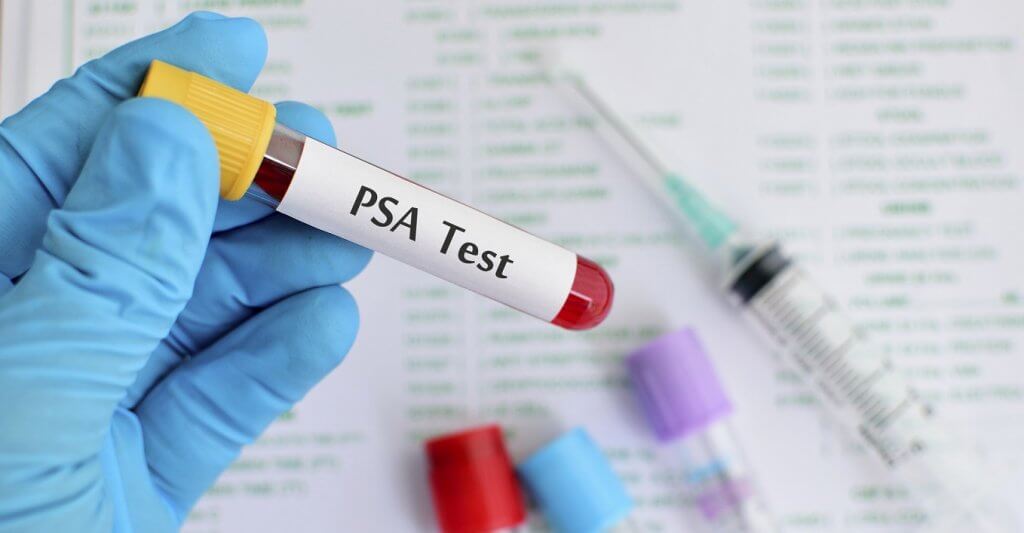There are many conditions except prostate cancer that can result in an elevated PSA. Conditions include trauma, infection of the prostate, or an enlarged prostate. Prostate is an organ that prone to a variety of dysfunctions and diseases. It should be noted also that many men have an elevated PSA for no particular reason whatsoever.

Normal and elevated PSA.
The early studies that were conducted in the eighties, considered level 4 ng/m to be a “watershed” PSA level, while everything above was considered as a sign of a serious decease. Modern neurologists do not take this PSA level as a telltale sign of cancer. Typically, a neurologist specializing in this field applies age-adjusted PSA test. Meaning, the younger you are, the lower your PSA should be. Conversely, the older you are, the higher your PSA can be. For example, if you are in your forties, your PSA should be 2.5 ng/ml or less. If you are in your early seventies, your PSA can go as high as 6.5 ng/ml, and some specialists would consider this level normal.
What to do if you the test shows PSA levels increased?
Let’s say you have your PSA test every year on a regular basis or several years in a row. Let’s say, the numbers of the PSA level have been so far around 2 ng/ml or 3 ng/ml. Suddenly, this year tests show the number is higher than 4 ng/ml, which is considered traditionally a “risk factor” number.
What should you do? Your first reaction could be, “Oh my God, I have prostate cancer!” A lot of medical specialists endorse exactly this reaction to the high level of PSA. However, recent scientific researches offer much more complicated view on the PSA numbers. The results of these give hope to desperate men who one day found out their PSA level is higher than usual.
In any case, no need to be desperate if your PSA tests return higher numbers one day. Prostate cancer is very slow. What you need to do, is to take control of your healthcare.
The procedural routine after PSA testing normally entails following steps: your general practitioner, when sees suspiciously high PSA numbers, is going to refer you to your general urologist, who, in his turn, will probably perform a needle biopsy right away.
Unless your PSA level is extremely high, like 15-20 ng/ml, or something is wrong during your digital rectum exam, we recommend you to say to your urologist that you want to perform yet another PSA test, before going through a needle biopsy. The PSA test measures the substance of blood in the prostate when it is aggravated, and can be caused by a number of other reasons than prostate cancer. These reasons include physical activity, inflammation, and many more.
If you took a test, and the results are above normal for your age, take a break from a heavy physical activity for a few weeks, relax, and then take another test. We recommend you to take another test in the period from 4 to 6 weeks from the previous one.
Is PSA testing reliable?
Statistics show that thirty percent of men with levels between 4 and 10 actually have cancer, while the rest seventy percent have causes other than that. On the other hand, if we consider men with PSA levels between 2 and 4, which are commonly considered as normal levels, we still find twenty percent of them having prostate cancer. The risk is still present.
If you see that new test shows a lower number than the previous test had shown, you do not have to worry. If the number remains high, then it is time to move to the next stage. We recommend you find an approved MRI (magnetic resonance imaging) center that performs multi parametric testing, which involves a 3T (3 tesla) scanning. The resulting MRI report will provide two types of information for you: the size of your prostate, which will show if your PSA elevation is proportionate to your prostate size. Secondly, the grade of prostate cancer, in the case you actually have it.
Controversies connected to PSA testing routine have led some groups of medical specialists to withdraw from this type of testing as a reliable way of screening prostate cancer. In any event, if you want to perform PSA tests, you should be aware of uncertainty in both alarming levels and normal levels as far as diagnosing prostate cancer is concerned.


